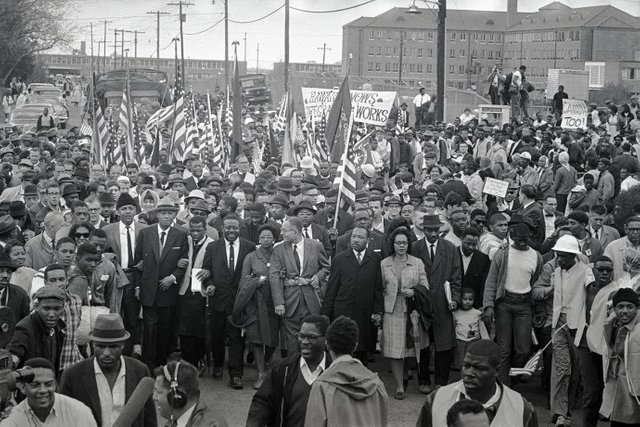The struggle for social justice remembered
through poetry.

Dr. Martin Luther King Jr. leads civil rights activists on
the last leg of their march from Selma to Montgomery,
Alabama in March 1965. Photo by Bettmann /
Contributor. Courtesy of Getty Images.
In 1865, Congress passed the 13th Amendment to the Constitution,
abolishing slavery in the United States. More than 150 years later, however, the
promise of liberty and justice for all citizens remains elusive. Jim Crow laws
passed by state legislatures between the 1870s and the 1950s established a formal
system of racial segregation in the South. Racist housing policies, job
discrimination, abuse by law enforcement, and negative stereotypes in popular
culture pervaded all regions of the United States.
Between the mid-1950s through the 1970s, citizens engaged in a massive
protest movement to fight for the rights and freedoms of all Americans. 1968 was
pivotal in the civil rights movement, marked by the assassination of Martin
Luther King Jr., the widespread riots that followed, and the passage of a new Civil
Rights Act. The poems collected here revisit the heroic struggles of civil rights
activists 50 years later. Poets influenced by the civil rights movement––a group that
includes Margaret Walker, Nikki Giovanni, and June Jordan––used their
work to instill a sense of pride in one’s identity, to praise freedom fighters and
honor fallen leaders, to chronicle acts of resistance, and to offer wisdom and
strength to fellow activists.
The poems are grouped by the dates of the events they address, with each poem’s
publication date in parentheses. We have included articles, audio and video
resources, and links for additional resources related to this momentous
period in American history.
//////////////////////////////////////////////////////////////////////////////////////////////////////////////////////////////////////////////////////////////////////////////////////
1954-1960
The Supreme Court declares segregated schools unconstitutional in Brown v. Board of Education (1954). Rosa Parks is arrested (1955), initiating the Montgomery bus boycott. Fourteen-year old Emmett Till is brutally murdered in Mississippi for allegedly whistling at a white woman (1955); the two men accused of his murder are acquitted by an all-white, all-male jury later that year. A group of high school students in Little Rock, Arkansas—“the Little Rock Nine”—enroll in Little Rock Central High School, prompting a mob of white protesters to harass, threaten, and throw stones at them as they attempt to enter the school (1957). The governor of Arkansas closes all public schools in Little Rock after winning reelection (1958). Little Rock’s public schools reopen as desegregated schools (1960). The Student Non-Violent Coordinating Committee is founded (1960).
Afterimages
AUDRE LORDE
(1982)
Miz Rosa Rides the Bus
ANGELA JACKSON
(1993)
Rosa Parks
NIKKI GIOVANNI
(2010)
The Little Rock 9
AFAA MICHAEL WEAVER
(2014)
1961-1964
The Congress of Racial Equality stages Freedom Rides to protest racial segregation (1961). Civil rights activist Medgar Evers is assassinated (June 1963). Martin Luther King Jr. delivers his “I Have a Dream” speech at the March on Washington (August 1963). White supremacists bomb the 16th Street Baptist Church in Birmingham, Alabama, killing four children (September 1963). President Kennedy is assassinated (November 1963). The Civil Rights Act is enacted (July 1964).
Short Speech to My Friends
AMIRI BARAKA
(1964)
For the Union Dead
ROBERT LOWELL
(1964)
November 22, 1963
LEWIS TURCO
(1964)
Ballad of Birmingham
DUDLEY RANDALL
(1965)
American History
MICHAEL S. HARPER
(1970)
February 12, 1963
JACQUELINE WOODSON
(2014)
1965-1970
Malcolm X and Alabama activist Jimmy Lee Jackson are assassinated within days of each other (February 1965). Six hundred protesters march from Selma to Montgomery to advocate for voting rights (March 1965). President Johnson signs the Voting Rights Act of 1965 (August). Leroi Jones (later known as Amiri Baraka) founds the Black Arts Repertory Theatre/School in Harlem (1965), igniting the beginning of the Black Arts Movement. The Black Panther Party is founded (1966). The Supreme Court Loving v. Virginia decision strikes down prohibitions on interracial marriage (1967). Martin Luther King Jr. is assassinated (April 1968), sparking days of riots in Washington, DC; Chicago; and Kansas City, among other cities. Robert F. Kennedy is assassinated while campaigning for president (June 1968). (Note: The following also includes poems that address civil rights events beyond the 1960s.)
African in This Different Land
SAM BRADLEY
(1965)
For Malcolm, A Year After
ETHERIDGE KNIGHT
(1966)
They Got Our Leader
PHILIP LEVINE
(1966)
A Historical Footnote to Consider Only When All Else Fails
NIKKI GIOVANNI
(1968)
Blues Alabama
MICHAEL S. HARPER
(1968)
RIOT
GWENDOLYN BROOKS
(1969)
The Third Sermon on The Warpland
GWENDOLYN BROOKS
(1969)
The Assassination
DONALD JUSTICE
(1969)
April 5, 1968
ALAN WILLIAMSON
(1970)
For Malcolm X
MARGARET WALKER
(1970)
In Memoriam: Martin Luther King, Jr.
JUNE JORDAN
(1971)
Harlem Hopscotch
MAYA ANGELOU
(1971)
A Fable
ETHERIDGE KNIGHT
(1973)
Power
AUDRE LORDE
(1976)
Dope
AMIRI BARAKA
(1979)
1977: Poem for Mrs. Fannie Lou Hamer
JUNE JORDAN
(1980)
Caged Bird
MAYA ANGELOU
(1983)
Staggerlee wonders
JAMES BALDWIN
(1985)
Sisters in Arms
AUDRE LORDE
(1986)
On a Highway East of Selma, Alabama
GREGORY ORR
(1988)
Malcolm X, February 1965
E. ETHELBERT MILLER
(1994)
History Lesson
NATASHA TRETHEWEY
(2000)
Miscegenation
NATASHA TRETHEWEY
(2007)
Narrative: Ali
ELIZABETH ALEXANDER
(2011)
Dancing with Strom
NIKKY FINNEY
(2011)
Devouring the Light, 1968
CHERYL BOYCE-TAYLOR
(2017)
“When I Grow Up, I Want to Be a Martyr”
CORTNEY LAMAR CHARLESTON
=====================================================================================
Hi! I am a robot. I just upvoted you! I found similar content that readers might be interested in:
https://www.poetryfoundation.org/collections/146367/poetry-and-the-civil-rights-movement
Downvoting a post can decrease pending rewards and make it less visible. Common reasons:
Submit